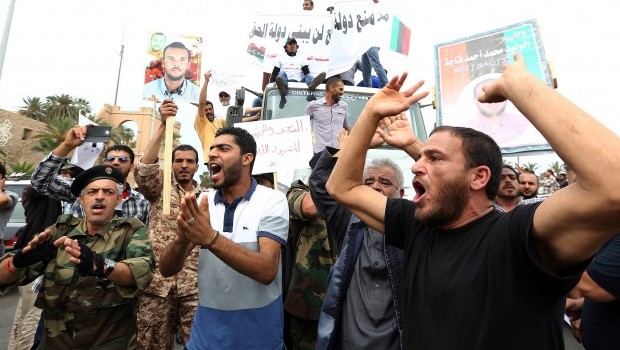
Libyan protesters hold placards and banners during a demonstration in support of the political isolation law, which bans Gaddafi-era officials from politics, in Libya’s landmark Martyrs Square on May 5, 2013 in Tripoli, Libya. (AFP PHOTO/MAHMUD TURKIA)
The law passed the country’s General National Congress (GNC) by 164 votes to 4, amid pressure from militias demanding its introduction and the removal of Gaddafi-era officials after months of parliamentary wrangling.
Under the new law, people who held official posts between 1969 and Gaddafi’s downfall in 2011 are to be excluded from political office, which could potentially affect Libya’s current prime minister, Ali Zeidan, and parliamentary speaker Mohamed Magaryef. Both men served as diplomats in Libya’s foreign ministry.
Membership in political parties is also forbidden, as is employment in state-owned businesses, universities and the judiciary.
A commission is to be tasked with overseeing the implementation of the law, which has proven to be a source of great controversy within Libya despite being passed with a decisive majority.
Militia groups in favor of the law occupied government ministries in Tripoli in protest last week, frustrated by the slow progress of the legislation through parliament. Armed men surrounded the Ministry of Justice and blockaded the ministries of foreign affairs, electricity, finance and the interior.
In March, groups of protestors also surrounded the Libyan parliament and barricaded legislators inside, demanding the law be adopted.
Following the vote, a parliamentary spokesman Omar Hmaiden told Al-Jazeera that MPs wanted the militias to pull back from the ministries they had surrounded.
“We hope the siege of the ministries will stop now, but it is not in our hands,” he said.
While hundreds of Libyans celebrated the passage of the law in Tripoli’s central square, international human rights groups warned that the legislation was open to abuse and lacked legal safeguards.
A statement from Human Rights Watch (HRW) said: “The law lacks guarantees for people subject to exclusion of minimum due process rights, such as the right to be heard during the hearing and the right to legal counsel.”
The organization also criticized revisions to Libya’s interim constitution that excluded the law from judicial review.
Sarah Whitson, HRW’s Middle East director, said on Saturday: “Libyans have a right to expect that officials who abused their positions under Gaddafi to commit crimes or violate human rights will be removed and never again allowed to hold public office … But this law is far too vague—potentially barring anyone who ever worked for the authorities during the four decades of Gaddafi’s rule.
“The GNC should not allow itself to be railroaded into making very bad laws because groups of armed men are demanding it. Libya’s long-term prospects for peace and security will be seriously diminished if the congress agrees to nod through this law.”
